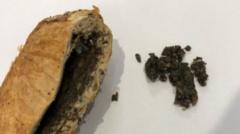The jury in a high-profile Australian trial has retired to deliberate the fate of Erin Patterson, who is accused of murdering three relatives by serving a lunch laced with toxic mushrooms. The case highlights the tension between accidental harm and intentional wrongdoing in food safety.
Jury Deliberates in Australian 'Mushroom Murder' Case

Jury Deliberates in Australian 'Mushroom Murder' Case
Erin Patterson faces serious charges related to a fatal lunch served to family members, igniting national debate on safety and accountability in foraging.
The jury has officially retired to consider the fate of Erin Patterson, a 50-year-old woman from Australia accused of serving a deadly mushroom-laced meal that resulted in the deaths of three family members. Patterson has pleaded not guilty to three counts of murder and one count of attempted murder regarding a lunch they ate at her home in July 2023, which included beef Wellington reportedly tainted with the lethal death cap mushroom.
Prosecutors assert that Patterson knowingly included the toxic mushrooms in the meal, subsequently lying to law enforcement and discarding key evidence. They argue that her intentional misrepresentation of a cancer diagnosis to lure her relatives for the meal reflects a premeditated motive. Meanwhile, the defense maintains that the mushroom inclusion was an accident and that Patterson's subsequent actions were panic-driven responses to a tragic situation.
Following the lunch, Patterson's in-laws, both aged 70, and her sister-in-law, 66, became severely ill and died shortly thereafter. Only Heather's husband, who spent weeks in an induced coma, managed to recover. The day prior to the lunch, Patterson’s estranged husband had opted out of attending the gathering.
With a lengthy trial that featured over 50 witnesses and detailed testimony from both the prosecution and defense, Justice Christopher Beale provided final instructions to the jury. He emphasized that their role was to scrutinize the evidence and determine the facts without emotional bias toward the grieving families involved.
The prosecution's lawyer, Nanette Rogers, described Patterson's behavior as deceptive, suggesting her many lies were signs of guilt. Contrarily, the defense pointed out the lack of a clear motive and argued that Patterson had a close relationship with her in-laws, which undermines any claims of intent to harm them. They also noted her struggles with bulimia, which contributed to her not becoming ill alongside her family after the meal.
The jury has now been sequestered to ensure a thorough and unbiased deliberation process, with no external distractions until they reach a verdict. Ultimately, this case raises broader questions around food safety and the responsibilities that come with foraging for wild ingredients.
Prosecutors assert that Patterson knowingly included the toxic mushrooms in the meal, subsequently lying to law enforcement and discarding key evidence. They argue that her intentional misrepresentation of a cancer diagnosis to lure her relatives for the meal reflects a premeditated motive. Meanwhile, the defense maintains that the mushroom inclusion was an accident and that Patterson's subsequent actions were panic-driven responses to a tragic situation.
Following the lunch, Patterson's in-laws, both aged 70, and her sister-in-law, 66, became severely ill and died shortly thereafter. Only Heather's husband, who spent weeks in an induced coma, managed to recover. The day prior to the lunch, Patterson’s estranged husband had opted out of attending the gathering.
With a lengthy trial that featured over 50 witnesses and detailed testimony from both the prosecution and defense, Justice Christopher Beale provided final instructions to the jury. He emphasized that their role was to scrutinize the evidence and determine the facts without emotional bias toward the grieving families involved.
The prosecution's lawyer, Nanette Rogers, described Patterson's behavior as deceptive, suggesting her many lies were signs of guilt. Contrarily, the defense pointed out the lack of a clear motive and argued that Patterson had a close relationship with her in-laws, which undermines any claims of intent to harm them. They also noted her struggles with bulimia, which contributed to her not becoming ill alongside her family after the meal.
The jury has now been sequestered to ensure a thorough and unbiased deliberation process, with no external distractions until they reach a verdict. Ultimately, this case raises broader questions around food safety and the responsibilities that come with foraging for wild ingredients.

















